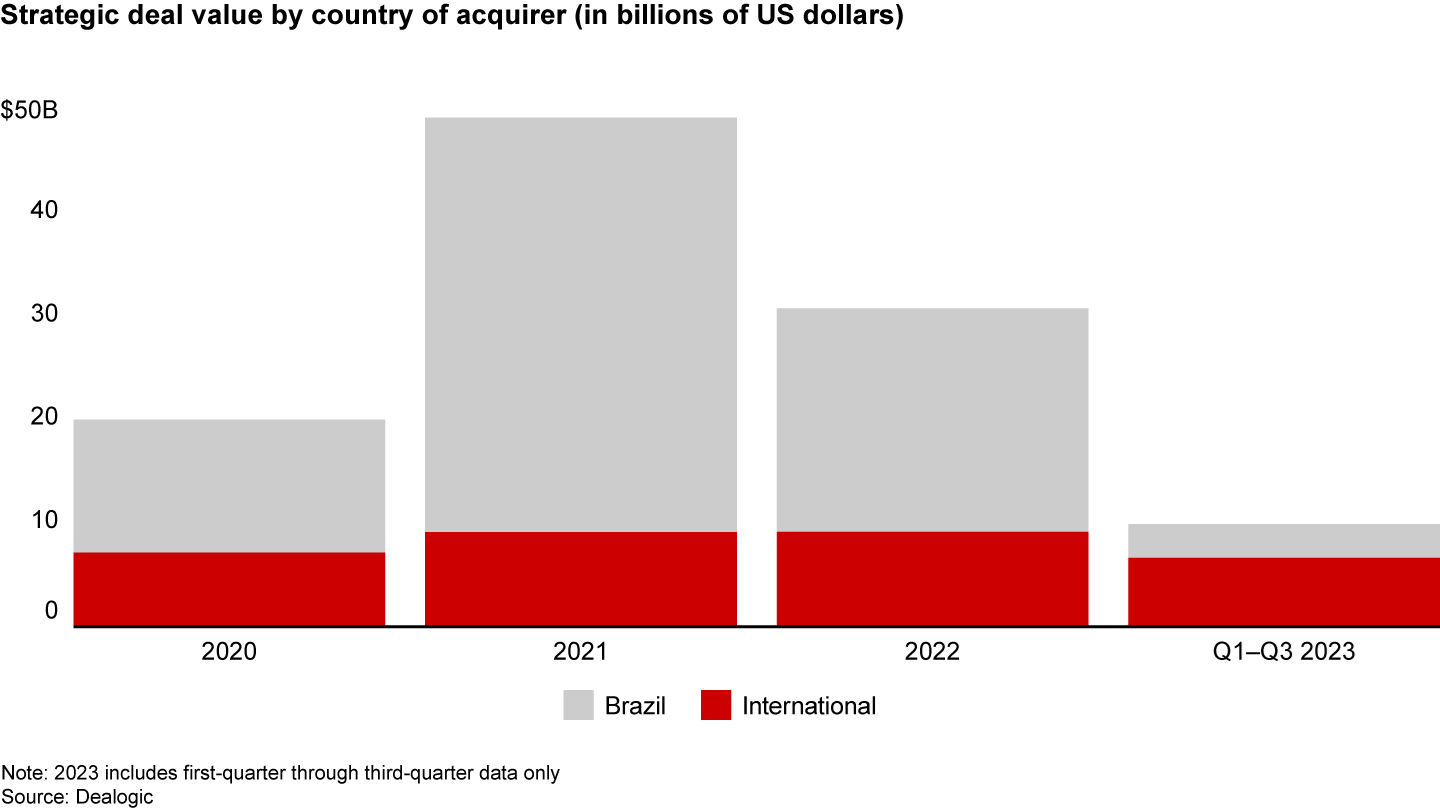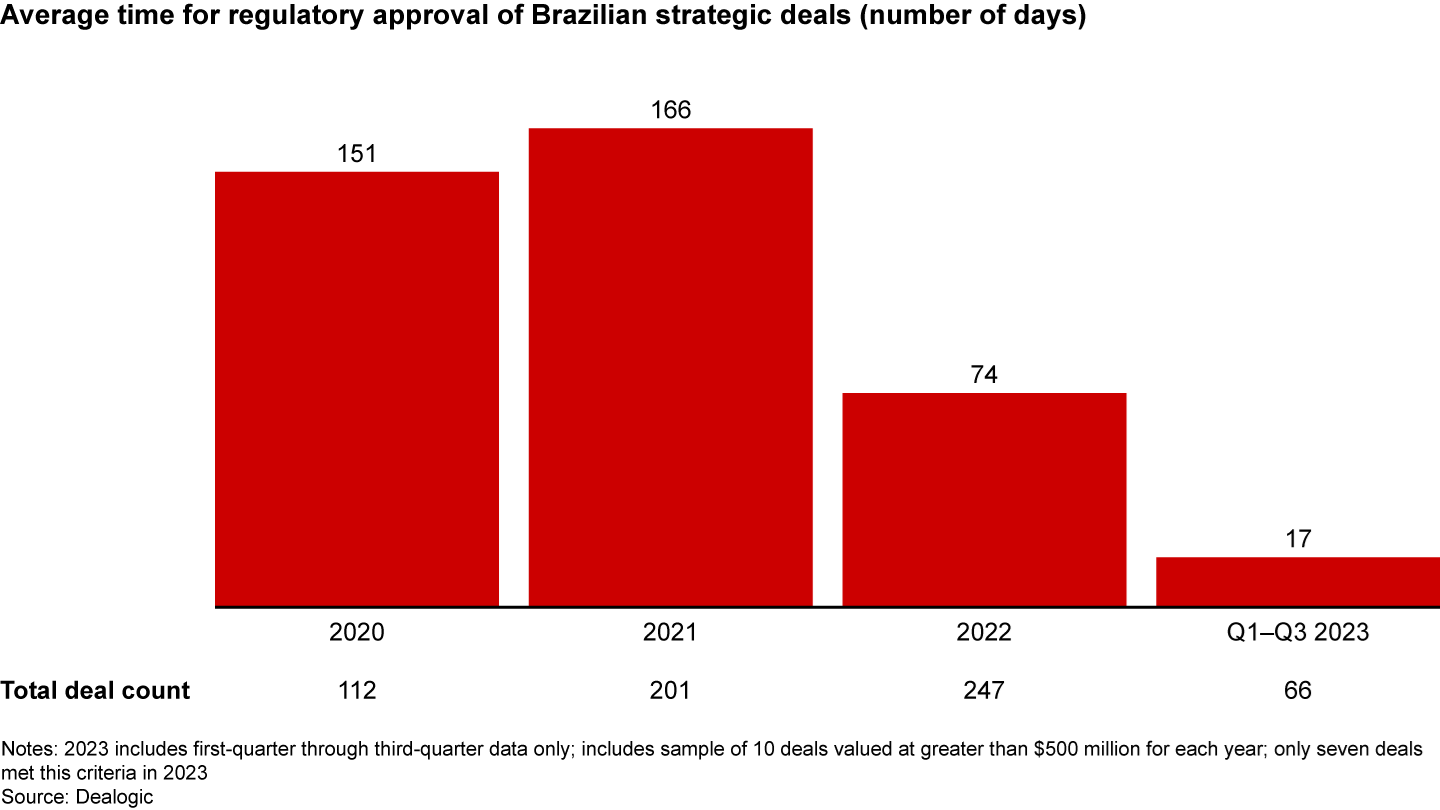M&A Report

Резюме
- 2023 was a down year for M&A activity in Brazil because of a reduction in domestic deals.
- The nation’s central bank started cutting rates, and the International Monetary Fund raised its growth projection.
- Acquirers from Brazil and abroad need to prepare for hotter deal competition and having less time for closings.
This article is part of Bain's 2024 M&A Report.
A promising economy and policy changes that sped up regulatory review made Brazil an attractive market for foreign acquirers in 2023. Some notable domestic deals did occur, such as the merger of two of Brazil’s largest shopping mall operators, Aliansce Sonae and BR Malls, in a year that started slowly but picked up following structural market tailwinds in the second half. But acquisitions by foreign buyers eclipsed those of domestic buyers (see Figure 1).
Domestic investors held back from the M&A scene in Brazil while foreign investment was more resilient


The sharp decline in M&A activity in the first half of the year can largely be attributed to an environment of higher interest rates, low economic growth, and uncertainty regarding the newly established government. By midyear, however, as the central bank began to cut interest rates and the International Monetary Fund increased its projection for Brazil’s economic growth by almost a full percentage point, an optimistic outlook emerged that starkly contrasted with the backdrop of a global slowdown. Further improving conditions, Brazil’s Administrative Council for Economic Defense (CADE) bucked the global trend of increased regulatory scrutiny with a commitment to a speedier M&A approval process. In the first nine months of the year, CADE’s ambition to process antitrust reviews within 30 days had already been achieved for deals greater than $500 million, making that critical step happen four times faster than it did in 2022 (see Figure 2).
Average approval time in Brazil in 2023 was about four times faster than 2022


For foreign acquirers, the dampened competition from domestic players and favorable market conditions created unique opportunities. In contrast to domestic buyers who scaled back M&A activity amid perceived misalignments in valuations and high interest rates, foreign acquirers acted on assets that were comparatively underpriced vs. many emerging markets and made bold moves in a time of transition.
As the world’s third-largest producer of battery metals, which are critical to the electric vehicle supply chain, Brazil’s energy and natural resources (ENR) industry saw a boom from international interest (for more, see “M&A in Automotive and Mobility: Deals to Secure a Place in the Industry’s Future”). Among the $8.2 billion of foreign M&A value in the ENR sector was the sale of a 13% stake in Vale’s energy transition metals business to both Manara Minerals of Saudi Arabia and investment firm Engine No. 1 for $3.4 billion. Consolidation opportunities in the financial services sector also caught the attention of foreign acquirers, with Talanx of Germany becoming one of the top insurers in Latin America by acquiring companies from Liberty Mutual.
By the second half of the year, domestic acquirers were back in the game. While much of the activity early in the year involved the sale of distressed assets or was prompted by the need to reduce debt, domestic players began taking advantage of lower interest rates after the central bank initiated a rate-cutting cycle in August. One such example was Minerva Foods’ $1.5 billion acquisition of 16 slaughterhouse plants in Latin America from rival Marfrig Global Foods in a transformational deal expected to double its production capacity.
As domestic dealmakers shake off the dust from a relatively low year of M&A activity in 2023, the market for the year ahead is likely to look different. Regulatory timelines are continuing to shorten, macroeconomic factors are increasingly favorable, and the presence and attention of international acquirers is unlikely to subside. Domestic private equity funds also have substantial dry powder after being largely absent from the market in 2023.
Yet while deal math may get easier, competition will increase. And companies need to be ready to act.
With momentum picking up, it is imperative that buyers have a clear M&A strategy and a robust screening and sourcing process to identify potential opportunities in a market that could become crowded with new competitors. As industries remain ripe for transformation, winning companies will keep an eye on bold moves—such as the impending disruption of the online banking sector or the burst of activity expected in renewables—to avoid getting left behind.
Meanwhile, the shortening of the approval process comes with its own new challenges. As turnaround times for antitrust approvals decrease, some of the big risks inherent to many deals diminish. Leaders will worry less about the flight of key talent or the potential loss of focus on the base business, but it also means that companies have less time to prepare for the new company’s day one. To maintain momentum, it’s critical to have the end goal in mind. That means defining future governance structures and integration plans early. It means ensuring clarity on synergy targets and having a clear roadmap to value creation. Companies that outpace competitors will make certain that key people are involved and ready to hit the ground running when the deal does close.
Time is now of the essence in Brazil.